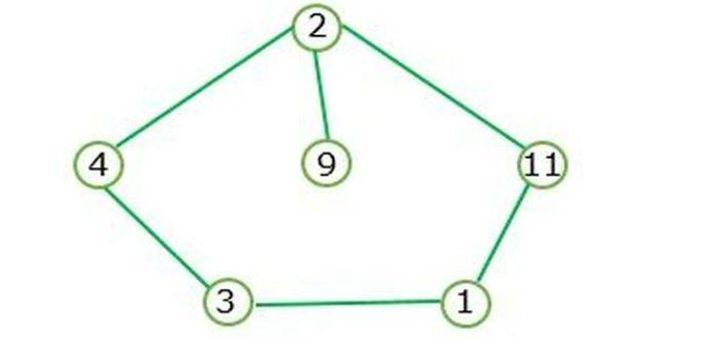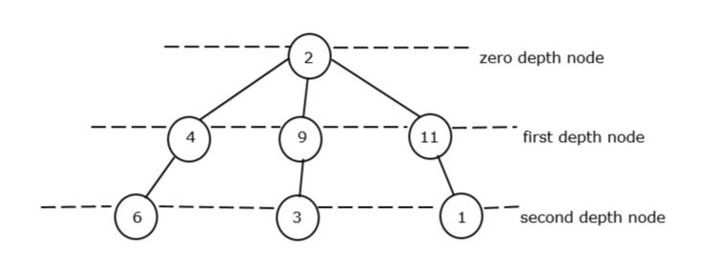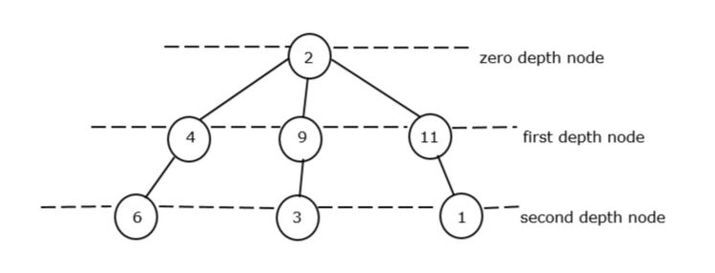給定一個非循環圖,計算每個深度的最小元素總和
不包含任何循環或迴路的圖稱為非循環圖。樹是一種非循環圖,其中每個節點都與另一個唯一節點相連。非循環圖也稱為無環圖。
循環圖與非循環圖的差異 -
Cycle Graph | 的中文翻譯為:循環圖 |
非循環圖 |
|---|---|---|
#圖形形成一個閉環。 |
圖表沒有形成閉環。 |
|
圖表中不包含深度循環 |
圖表包含每個深度。 |
範例 1
讓我們舉一個循環圖的例子 −
當閉環存在時,就形成了循環圖。

Figure I代表了循環圖,不包含深度節點。
Example 2
的翻譯為:範例2
讓我們以一個非循環圖的例子來說明:

樹的根節點稱為零深度節點。在圖 II 中,在零深度處只有一個根,即 2。因此它被認為是最小深度為零的節點。
在第一個深度節點中,我們有3個節點元素,如4、9和1,但最小的元素是4。
在第二個深度節點中,我們又有3個節點元素,如6、3和1,但最小元素是1。
我們將知道總深度節點是如何得出的,
總深度節點 = Zero_Depth 節點的最小值 First_Depth 節點的最小值 Zero_Depth 節點的最小值
總深度節點 = 2 4 3 = 9。所以,9是非循環圖的總最小和。
文法
The following syntax used in the program:
struct name_of_structure{
data_type var_name;
// data member or field of the structure.
}
struct − 此關鍵字用來表示結構資料型態。
name_of_struct - 我們為結構提供任何名稱。
結構是將各種相關變數集中在一個地方的集合。
Queue < pair < datatype, datatype> > queue_of_pair
make_pair()
參數
C 中的對隊列 -
這是用於組合兩種不同資料類型的佇列對的通用 STL 模板,佇列對位於公用程式頭檔下。
Queue_of_pair - 我們為該對指定任何名稱。
make_pair() - 用於建構具有兩個元素的pair物件。
name_of_queue.push()
參數
name_of_queue - 我們正在命名佇列名稱。
push() − 這是一個預先定義的方法,屬於佇列頭部的一部分,push方法的作用是插入元素或值。
name_of_queue.pop()
參數
name_of_queue − 我們正在為佇列命名。
pop() − 這是一個預先定義的方法,屬於佇列頭文件,並且使用pop方法是為了刪除整個元素或值。
演算法
我們將啟動程式頭文件,即'iostream'、'climits'、'utility'、和'queue'。
< /里>#我們正在建立具有整數值「val」的結構「tree_node」來取得節點值。然後我們用給定的資料建立tree_node指標來初始化左子節點和右子節點來儲存值。接下來,我們建立一個 tree_node 函數,其中 int x 作為參數傳遞,並驗證它是否等於 'val' 整數,並將左右子節點指派為 null 。
現在我們將定義一個函數 minimum_sum_at_each_depth(),它接受一個整數值作為參數,用於找到每個深度的最小和。使用 if- 語句,它檢查樹的根值是否為空,如果為空則傳回 0。
我們正在建立STL(標準範本庫)的佇列對,以組合兩個值。
我們建立了一個名為q的佇列變量,它會作為一對進行兩個方法,即push()和make_pair()。使用這兩個方法,我們插入值並建構了一個物件的兩對。
我們正在初始化三個變量,即 'present_depth','present_sum' 和 'totalSum',這些變數將用於進一步找到當前總和以及找到總最小總和。
在初始化變數之後,我們建立一個while迴圈來檢查條件,如果佇列對不為空,則節點的計數將從開頭開始。接下來,我們使用‘pop()’方法刪除一個現有的節點,因為它將移動到樹的下一個深度來計算最小和。
現在我們將建立三個 if 語句來傳回總和的最小和。
在此之後,我們將開始主要的函數,並藉助根指標、左右子節點分別建立輸入模式的樹狀結構,並透過新的'tree_node'傳遞節點值。
最後,我們呼叫‘minimum_sum_at_each_depth(root)’函數並傳遞參數root來計算每個深度的最小總和。接下來,列印語句「非循環圖各深度的總和」並得到結果。
請記住,對佇列是一個包含佇列元素對的容器。
Example
的中文翻譯為:範例
在這個程式中,我們將計算每個深度的所有最小節點的總和。

在圖二中,總深度的最小和為15 8 4 1 = 13。
现在我们将把这个数字作为该程序的输入。
#include <iostream>
#include <queue>
// required for FIFO operation
#include <utility>
// required for queue pair
#include <climits>
using namespace std;
// create the structure definition for a binary tree node of non-cycle graph
struct tree_node {
int val;
tree_node *left;
tree_node *right;
tree_node(int x) {
val = x;
left = NULL;
right = NULL;
}
};
// This function is used to find the minimum sum at each depth
int minimum_sum_at_each_depth(tree_node* root) {
if (root == NULL) {
return 0;
}
queue<pair<tree_node*, int>> q;
// create a queue to store node and depth and include pair to combine two together values.
q.push(make_pair(root, 0));
// construct a pair object with two element
int present_depth = -1;
// present depth
int present_sum = 0;
// present sum for present depth
int totalSum = 0;
// Total sum for all depths
while (!q.empty()) {
pair<tree_node*, int> present = q.front();
// assign queue pair - present
q.pop();
// delete an existing element from the beginning
if (present.second != present_depth) {
// We are moving to a new depth, so update the total sum and reset the present sum
present_depth = present.second;
totalSum += present_sum;
present_sum = INT_MAX;
}
// Update the present sum with the value of the present node
present_sum = min(present_sum, present.first->val);
//We are adding left and right children to the queue for updating the new depth.
if (present.first->left) {
q.push(make_pair(present.first->left, present.second + 1));
}
if (present.first->right) {
q.push(make_pair(present.first->right, present.second + 1));
}
}
// We are adding the present sum of last depth to the total sum
totalSum += present_sum;
return totalSum;
}
// start the main function
int main() {
tree_node *root = new tree_node(15);
root->left = new tree_node(14);
root->left->left = new tree_node(11);
root->left->right = new tree_node(4);
root->right = new tree_node(8);
root->right->left = new tree_node(13);
root->right->right = new tree_node(16);
root->left->left->left = new tree_node(1);
root->left->right->left = new tree_node(6);
root->right->right->right = new tree_node(2);
root->right->left->right = new tree_node(7);
cout << "Total sum at each depth of non cycle graph: " << minimum_sum_at_each_depth(root) << endl;
return 0;
}
输出
Total sum at each depth of non cycle graph: 28
结论
我们探讨了给定非循环图中每个深度的元素最小和的概念。我们看到箭头运算符连接节点并构建树形结构,利用它计算每个深度的最小和。该应用程序使用非循环图,例如城市规划、网络拓扑、谷歌地图等。
以上是給定一個非循環圖,計算每個深度的最小元素總和的詳細內容。更多資訊請關注PHP中文網其他相關文章!

熱AI工具

Undresser.AI Undress
人工智慧驅動的應用程序,用於創建逼真的裸體照片

AI Clothes Remover
用於從照片中去除衣服的線上人工智慧工具。

Undress AI Tool
免費脫衣圖片

Clothoff.io
AI脫衣器

Video Face Swap
使用我們完全免費的人工智慧換臉工具,輕鬆在任何影片中換臉!

熱門文章

熱工具

記事本++7.3.1
好用且免費的程式碼編輯器

SublimeText3漢化版
中文版,非常好用

禪工作室 13.0.1
強大的PHP整合開發環境

Dreamweaver CS6
視覺化網頁開發工具

SublimeText3 Mac版
神級程式碼編輯軟體(SublimeText3)
 C語言數據結構:樹和圖的數據表示與操作
Apr 04, 2025 am 11:18 AM
C語言數據結構:樹和圖的數據表示與操作
Apr 04, 2025 am 11:18 AM
C語言數據結構:樹和圖的數據表示與操作樹是一個層次結構的數據結構由節點組成,每個節點包含一個數據元素和指向其子節點的指針二叉樹是一種特殊類型的樹,其中每個節點最多有兩個子節點數據表示structTreeNode{intdata;structTreeNode*left;structTreeNode*right;};操作創建樹遍歷樹(先序、中序、後序)搜索樹插入節點刪除節點圖是一個集合的數據結構,其中的元素是頂點,它們通過邊連接在一起邊可以是帶權或無權的數據表示鄰
 C語言文件操作難題的幕後真相
Apr 04, 2025 am 11:24 AM
C語言文件操作難題的幕後真相
Apr 04, 2025 am 11:24 AM
文件操作難題的真相:文件打開失敗:權限不足、路徑錯誤、文件被佔用。數據寫入失敗:緩衝區已滿、文件不可寫、磁盤空間不足。其他常見問題:文件遍歷緩慢、文本文件編碼不正確、二進製文件讀取錯誤。
 c上標3下標5怎麼算 c上標3下標5算法教程
Apr 03, 2025 pm 10:33 PM
c上標3下標5怎麼算 c上標3下標5算法教程
Apr 03, 2025 pm 10:33 PM
C35 的計算本質上是組合數學,代表從 5 個元素中選擇 3 個的組合數,其計算公式為 C53 = 5! / (3! * 2!),可通過循環避免直接計算階乘以提高效率和避免溢出。另外,理解組合的本質和掌握高效的計算方法對於解決概率統計、密碼學、算法設計等領域的許多問題至關重要。
 c語言函數的基本要求有哪些
Apr 03, 2025 pm 10:06 PM
c語言函數的基本要求有哪些
Apr 03, 2025 pm 10:06 PM
C語言函數是代碼模塊化和程序搭建的基礎。它們由聲明(函數頭)和定義(函數體)組成。 C語言默認使用值傳遞參數,但也可使用地址傳遞修改外部變量。函數可以有返回值或無返回值,返回值類型必須與聲明一致。函數命名應清晰易懂,使用駝峰或下劃線命名法。遵循單一職責原則,保持函數簡潔性,以提高可維護性和可讀性。
 c語言函數名定義
Apr 03, 2025 pm 10:03 PM
c語言函數名定義
Apr 03, 2025 pm 10:03 PM
C語言函數名定義包括:返回值類型、函數名、參數列表和函數體。函數名應清晰、簡潔、統一風格,避免與關鍵字衝突。函數名具有作用域,可在聲明後使用。函數指針允許將函數作為參數傳遞或賦值。常見錯誤包括命名衝突、參數類型不匹配和未聲明的函數。性能優化重點在函數設計和實現上,而清晰、易讀的代碼至關重要。
 c語言函數的概念
Apr 03, 2025 pm 10:09 PM
c語言函數的概念
Apr 03, 2025 pm 10:09 PM
C語言函數是可重複利用的代碼塊,它接收輸入,執行操作,返回結果,可將代碼模塊化提高可複用性,降低複雜度。函數內部機制包含參數傳遞、函數執行、返回值,整個過程涉及優化如函數內聯。編寫好的函數遵循單一職責原則、參數數量少、命名規範、錯誤處理。指針與函數結合能實現更強大的功能,如修改外部變量值。函數指針將函數作為參數傳遞或存儲地址,用於實現動態調用函數。理解函數特性和技巧是編寫高效、可維護、易理解的C語言程序的關鍵。
 C語言多線程編程:新手指南與疑難解答
Apr 04, 2025 am 10:15 AM
C語言多線程編程:新手指南與疑難解答
Apr 04, 2025 am 10:15 AM
C語言多線程編程指南:創建線程:使用pthread_create()函數,指定線程ID、屬性和線程函數。線程同步:通過互斥鎖、信號量和條件變量防止數據競爭。實戰案例:使用多線程計算斐波那契數,將任務分配給多個線程並同步結果。疑難解答:解決程序崩潰、線程停止響應和性能瓶頸等問題。
 c語言如何輸出倒數
Apr 04, 2025 am 08:54 AM
c語言如何輸出倒數
Apr 04, 2025 am 08:54 AM
如何在 C 語言中輸出倒數?回答:使用循環語句。步驟:1. 定義變量 n 存儲要輸出的倒數數字;2. 使用 while 循環持續打印 n 直到 n 小於 1;3. 在循環體內,打印出 n 的值;4. 在循環末尾,將 n 減去 1 以輸出下一個更小的倒數。






